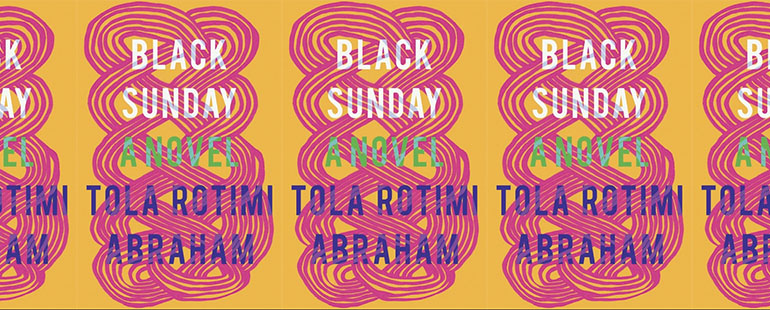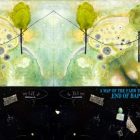Black Sunday by Tola Rotimi Abraham

Black Sunday
Tola Rotimi Abraham
Catapult | February 4, 2020
Black Sunday, the debut novel of Tola Rotimi Abraham, tells the story of a Nigerian family fractured when the parents abandon their marriage and four children. The children, two girls and two boys, narrate the story in separate chapters, but the older twin girls tell most of it. The book thus becomes an account of two girls’ maturation.
Bibike narrates first, as she and her sister Ariyike make their way home from school. It’s the first time they’ve been allowed to travel the city streets on their own, and Bibike is determined to appear savvy as they navigate the markets of Lagos, crowded with haggling merchants, idle soldiers, and beggar children. Details bring the street scene alive, quickening its pace. We can hear the man shouting at them, “Hey. Fine girl. Stop, see your money for ground,” as they hurry on, not daring to look. We can almost see the beggars with their cracked plastic bowls, singing in Yoruba. Abraham writes knowledgeably about life in Lagos, having grown up there before attending the Iowa Writers’ Workshop. As a child, she attended a Pentecostal church and weathered her parents’ breakup. When she portrays the scarring effects of religion and divorce, as she does in the developing plot, she’s writing what she knows.
When the girls arrive home, full of the bravado of nervous thirteen-year-olds, they learn that their mother has lost her job. Thus begins a downward financial spiral that, abetted by their father’s disastrous business schemes, ultimately pulls the family apart. The parents split up and move away, and the children move in with their grandmother, who is so elderly she can barely care for them. Out of necessity the girls go to work—Bibike as a custodian in a hospital and Ariyike as a side-of-the-road vendor selling bottled water. Now out of the house and out of school, they begin to see the linkage of sex, money, and religion on the path to power.
Bibike’s awakening occurs one day as she cleans a hospital bathroom. She sees a girl stuff a sanitary pad marked with red lipstick into her underwear, under her tight Lycra skirt. Only slightly older than Bibike, the girl seems vastly more worldly. Her boyfriend, a technician at the hospital, enters the bathroom and they argue about the coming weekend. They cannot meet, she says, because she has her period. He accuses her of lying and demands proof. They struggle, he hikes up her skirt, pulls down her panties and sees the red-stained pad. Convinced, he fishes into his jacket pocket and hands her money. For Bibike, who overhears the encounter, it is the beginning of the end of her naïveté, as she comes to understand the uses of deceit and money. The man, as she now sees him, regrets losing a “relationship that had cost him a lot of money to begin and maintain. He was ashamed of how excited he became after those few moments of struggle, deflated by the possibility that all that potential had gone to waste.”
Later, Bibike and the girl become friends. She visits the girl’s house, where a Mercedes sits in the driveway and her father pontificates on books the girls should read. Left alone with Bibike, the father moves close to her, so close she can smell dabino and sugarcane on his breath. She does not push him away, or even squirm. “I did not feel the disgust I would have expected to feel, but instead, a sense of relief, of superiority, that continued to accrete as he slid his hands down my dress, tugging on a nipple.” He seems to her “both shy and hopeful like a boy but also like a medicated puppy.”
While she may not feel dominated by this puppy-like man, she does feel trapped by what she perceives to be cultural expectations. All women are owned, or so she understands, but a beautiful woman can choose her owner. For herself, a beautiful nineteen-year-old, she fears she has waited too long to make a choice and now a man has chosen her. She succumbs and her initial feelings of relief and superiority give way to resignation.
By contrast, Ariyike’s initiation into the dynamics of sex and money is, on the surface, more innocuous, but it leaves deep and lasting effects. Of the four children, she is most transformed by what she learns as a teenager. At first, it’s only a matter of dealing with men who buy bottles of water from her. They wait until the traffic light is about to change before signaling for water, so they can watch her breasts jiggle as she runs after them.
But Ariyike is not defeated by the men’s objectification of her. In fact, she works it into a comedy routine she plans to perform when she auditions for a radio station job. It’s a dream job that would give her a salary, furnished apartment, driver, and allowance for clothes, hair, and makeup, what would be “a chance for the restoration of all we had lost.” When the station manager informs her the job has gone to someone else, he volunteers to introduce her to a Pentecostal pastor who has a religious radio show. The pastor’s church, it turns out, enabled the financial scheme that caused her family’s ruin. That might deter someone else, but not Ariyike. “If the church was coming again into my life as an answer, it was okay for me to be weary, but it was stupid for me to say no. Dexter was right. I needed a job. My whole family needed it.”
When she ends up in bed with the station manager, she is fully aware of her vulnerability. “As he stood at the foot, hurriedly stepping out of his jeans, I wondered about the bed, about how many other desperate dreaming girls like me had inevitably ended up on it, despite their initial hesitation.” But she puts those thoughts aside and turns her attention to the physical, even instructing the man to slow down and kiss her nipples, a surprisingly straightforward instruction from an inexperienced girl.
For Ariyike, sex becomes a tool for flipping the male-female power dynamic. Eventually she hitches herself to the pastor’s career and advances to a position of power in the church. Bibike’s trajectory is different. Once her friend’s father has faded out of the picture, sex is the means for physical pleasure, a step on the path toward a relationship built on respect and caring. For both, economic necessity colors their views of the world and their actions.
The book spans nineteen years, ending when the sisters are in their early thirties. Their success—being able to support themselves and pay their brothers’ school tuition—has come at a cost, more than they seem willing to acknowledge. Ariyike is tenacious about holding onto her lifestyle and power. She is willing to overlook her husband’s cronies’ sexual dalliances with young girls in order to keep the status quo. Bibike, in contrast, develops a caring relationship with a man, but she is scarred, unable truly to let down her guard, even with a man who loves her. Yet neither sister is a deeply reflective or introspective narrator. Given what they have gone through and the compromises they have made, regrets are inevitable, including about the rift between them that seems, at the end of the book, irreparable. But if they understand the harm their circumstances have inflicted, beyond the very real economic pain, they keep it to themselves. Readers are left to imagine their unspoken regrets and desires.



